Introduction
Welcome to the exciting world of ecommerce marketing automation, where your business can truly shine without the endless hustle!
Imagine being able to connect with your customers in a meaningful way, delivering the right message at the right time—all while freeing up your schedule. That’s the magic of ecommerce marketing automation!
It’s not just about sending emails or posting on social media; it’s about creating personalized experiences that make your customers feel valued. From automating your email campaigns to offering tailored product recommendations, this innovative approach helps streamline your marketing efforts and boost sales.
As the digital landscape continues to evolve, leveraging ecommerce marketing automation isn’t just smart—it’s essential. So, let’s dive into the different types of ecommerce marketing automation and see how they can elevate your business to new heights!
Understanding Ecommerce Marketing Automation
Ecommerce marketing automation is the engine that drives efficiency and growth in the online business world.
By implementing automation tools, ecommerce businesses can streamline processes, boost customer engagement, and increase sales—all while saving valuable time.

Let’s explore how ecommerce marketing automation transforms digital marketing efforts and the primary components that make it essential for any online business.
What is Ecommerce Marketing Automation?
Ecommerce marketing automation involves using specialized tools to automate, personalize, and manage marketing activities across various platforms.
This approach allows businesses to create customized campaigns, nurture customer relationships, and leverage data analytics to make better, more strategic decisions.
Ecommerce marketing automation helps brands stay competitive in a fast-paced market by reaching the right customers at the right time with minimal manual intervention.
Benefits of Ecommerce Marketing Automation

The benefits of ecommerce marketing automation are extensive. By automating repetitive tasks, businesses can focus on more strategic initiatives.
Automation tools enable companies to deliver personalized experiences, target campaigns to specific customer segments, and ultimately increase revenue.
For instance, a brand using ecommerce marketing automation can send targeted promotions, recover abandoned carts, and offer personalized recommendations—all of which enhance customer loyalty and retention.
According to a recent study, brands that use automation in their marketing efforts report up to a 30% boost in customer engagement and satisfaction.
Key Components of an Ecommerce Marketing Automation Platform
An effective ecommerce marketing automation platform includes various essential components, each aimed at optimizing specific marketing processes:
- Email Marketing Automation: Automated emails, such as welcome messages, abandoned cart reminders, and win-back campaigns, help nurture customer relationships and boost conversions.
- Social Media Automation: Schedule and manage social media posts to maintain consistent engagement with your audience.
- CRM Integration: Integrated customer relationship management (CRM) systems allow for personalized interactions, segmentation, and relationship-building efforts.
- Analytics Tools: Data-driven insights enable businesses to refine strategies and make informed decisions.
- Ecommerce Chatbots: Tools like BotPenguin, with 80+ integrations, help businesses automate customer interactions, recommend products, and assist with customer service. BotPenguin's affordable plans make it accessible for companies of all sizes, helping to streamline support and drive conversions without breaking the bank.
Types of Ecommerce Marketing Automation
Ecommerce marketing automation covers various strategies and tools that revolutionize the customer journey, fostering engagement and driving sales.
Here’s a look at some impactful types of ecommerce automation:
Email Marketing Automation
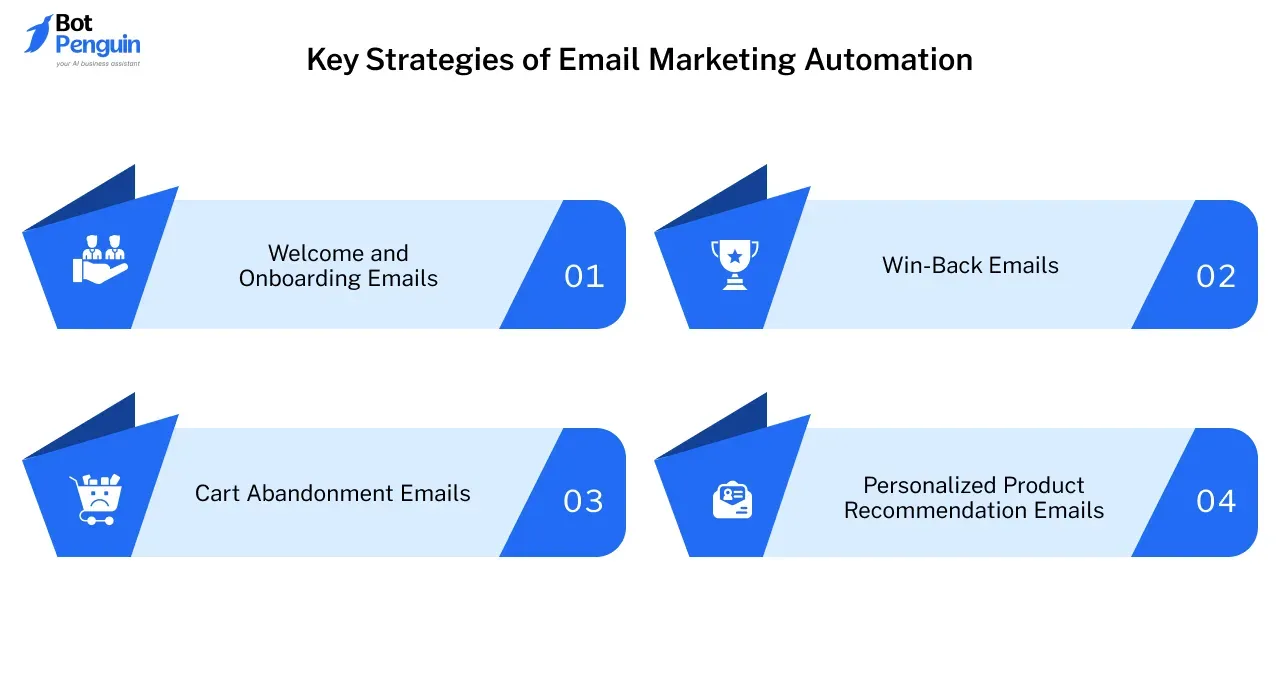
Email marketing automation is foundational to effective ecommerce marketing, offering a direct way to engage customers with relevant, personalized messages. Key strategies include:
- Welcome and Onboarding Emails: These emails make a great first impression, guiding new customers through the initial stages and setting a positive tone for future interactions.
For example, a skincare brand can use welcome emails to introduce its product line and offer a discount on the first purchase.
- Cart Abandonment Emails: Abandoned cart emails aim to recover potentially lost sales by reminding customers of their pending purchases.
Many brands incentivize customers to complete their orders with discount codes or free shipping offers, and it’s reported that these emails can recover up to 20% of abandoned carts.
- Win-Back Emails: Win-back emails are aimed at re-engaging customers who haven’t purchased in a while. By offering tailored incentives or highlighting new products, win-back emails can draw customers back to the brand.
- Personalized Product Recommendation Emails: Using customer data, these emails suggest products based on browsing history and past purchases, making shopping more engaging and increasing the likelihood of conversions.
SMS Marketing Automation
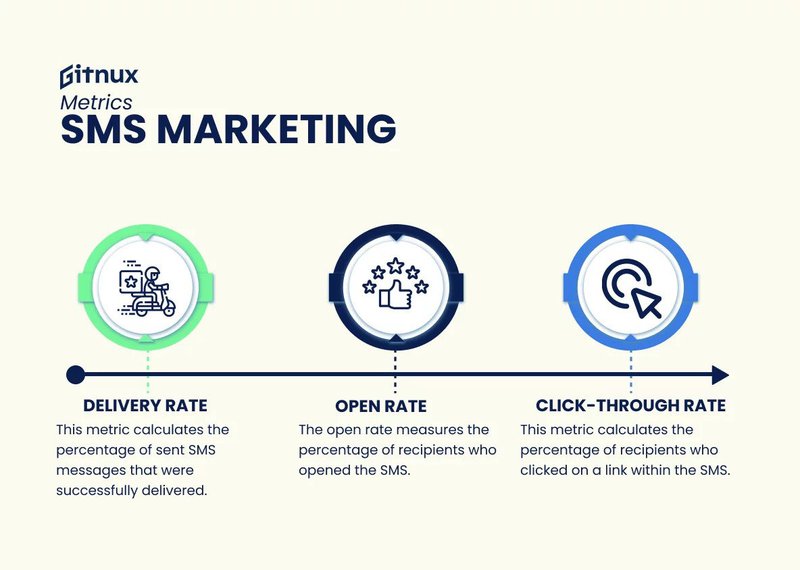
Ecommerce marketing automation includes SMS as one of the most immediate and impactful channels for businesses to communicate with customers directly.
With open rates as high as 98%, SMS marketing automation ensures that messages reach customers quickly, enhancing the overall experience.
From order confirmations to promotions, SMS can significantly drive customer satisfaction and revenue.
Order Confirmation and Shipping Updates
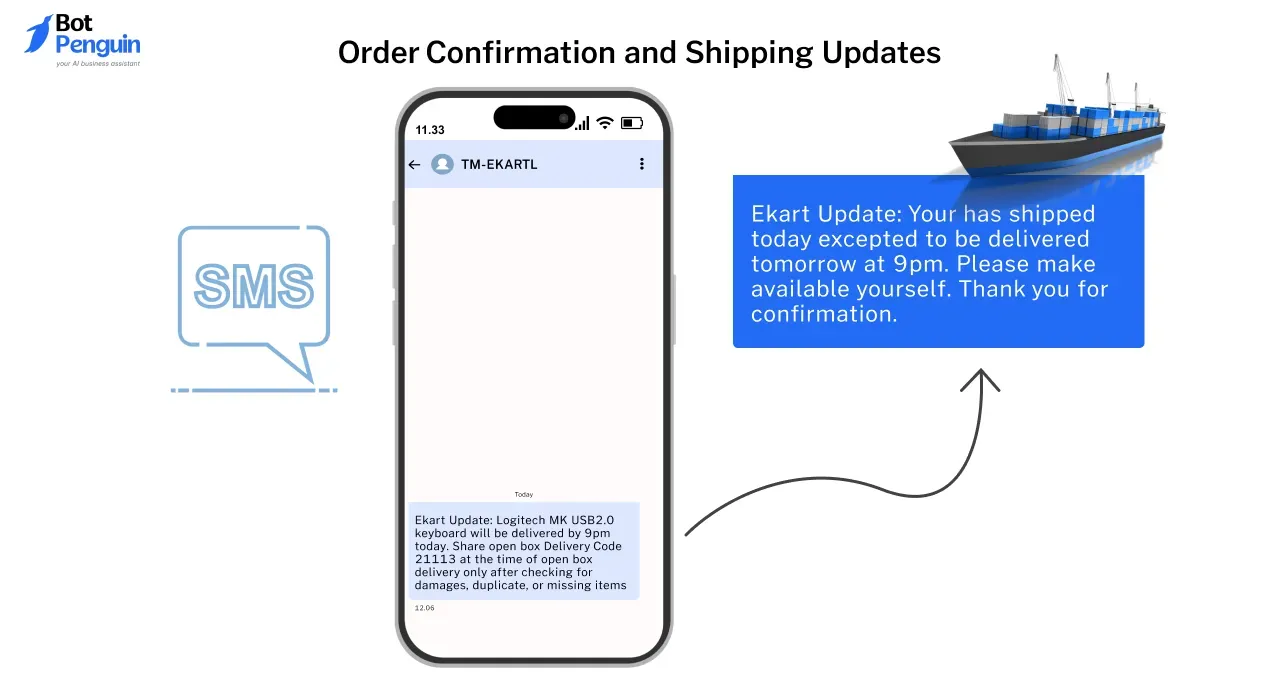
Automated SMS notifications for order confirmations and shipping updates keep customers informed throughout their purchase journey.
For example, Amazon uses SMS to notify customers about shipping status and estimated delivery times, reducing inquiries and boosting trust in the brand.
This proactive approach, a staple in ecommerce marketing automation, provides transparency, which enhances customer satisfaction and builds loyalty.
Promotional Offers and Discounts
Sending promotional offers via SMS creates urgency and drives immediate sales. A popular pizza chain, Domino’s, saw a 22% increase in orders after sending SMS-exclusive discount codes to subscribers.
This direct approach, which is a crucial part of marketing automation for ecommerce, captures attention and prompts swift customer action, maximizing conversions.
Abandoned Cart Reminders
Abandoned cart reminders via SMS provide a quick nudge for customers who’ve left items in their cart.
Brands like Sephora use SMS to send reminders with incentives, such as a small discount, to encourage customers to complete their purchases.
These reminders capitalize on the immediacy of SMS, reducing cart abandonment rates and recovering lost revenue—a vital aspect of any ecommerce automation strategy.
Chatbot Automation
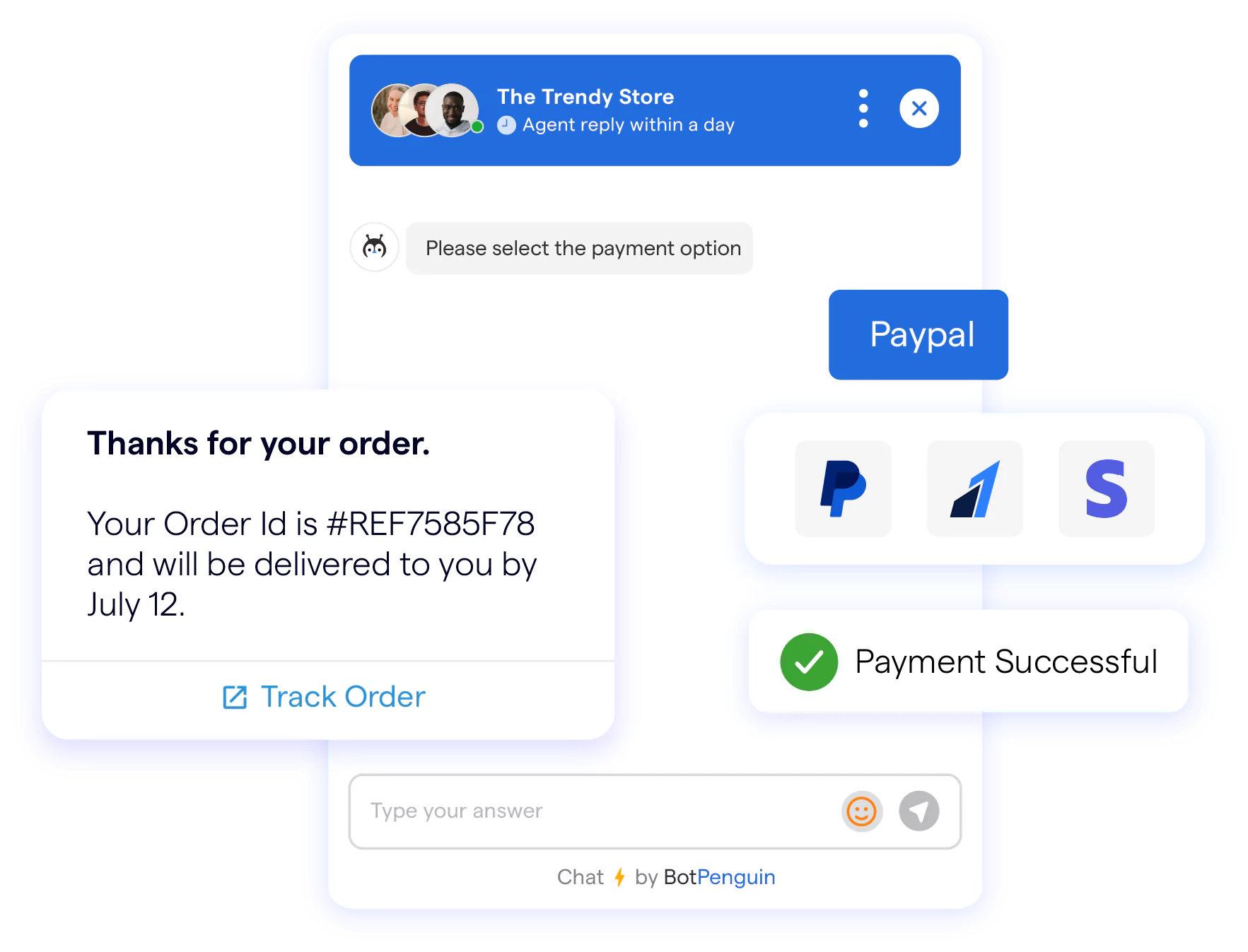
Chatbot automation is transforming ecommerce marketing automation by delivering instant, personalized interactions that elevate the customer experience.
Through AI-powered chatbots, ecommerce brands can offer 24/7 support, enhance sales, and streamline customer engagement across various touchpoints.
Customer Support Chatbots
Customer support chatbots handle frequent queries, providing immediate assistance day or night. This instant support improves customer satisfaction and frees up human agents for more complex issues.
For example, BotPenguin’s chatbots can quickly answer questions about orders, returns, and general inquiries, ensuring customers receive prompt responses without waiting. This automation is invaluable for keeping customers happy and engaged.
Sales and Marketing Chatbots
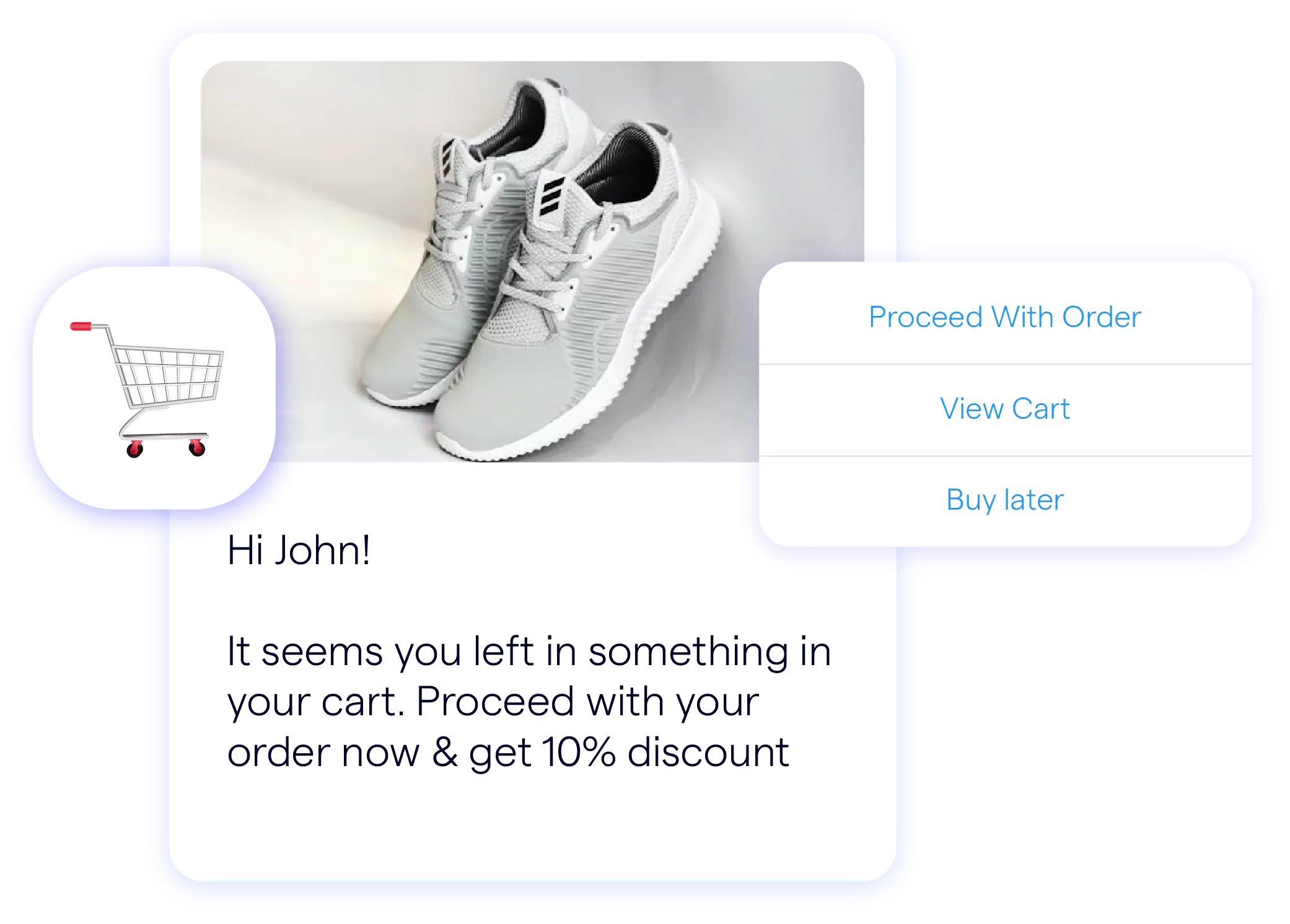
Sales chatbots proactively engage customers, recommending products and sharing promotions based on individual preferences. BotPenguin excels here, with over 80 integrations, enabling ecommerce businesses to automate marketing tasks seamlessly.
From lead nurturing to upselling, BotPenguin’s chatbots can interact with customers at key stages in their journey, encouraging them to make purchases. By integrating BotPenguin into ecommerce marketing automation, businesses can see a notable boost in conversions.
Conversational Commerce Chatbots
Conversational commerce chatbots allow customers to browse products, make selections, and complete transactions—all within the chatbot.
BotPenguin’s chatbots streamline this process, creating a smooth, interactive shopping experience directly in messaging platforms like WhatsApp and Facebook Messenger.
This level of convenience, which is core to ecommerce marketing automation, not only boosts sales but enhances customer satisfaction by making the purchasing process quick and simple.
Social Media Marketing Automation
In ecommerce marketing automation, social media automation is invaluable for managing brand presence, driving engagement, and analyzing performance.
Automated tools streamline tasks, allowing businesses to focus on building relationships and expanding their reach.
Automated Posting and Scheduling

Automated scheduling tools allow brands to post consistently across platforms without manual effort.
For instance, Hootsuite enables companies to plan content for Instagram, Facebook, and LinkedIn, reaching audiences at peak times without added work. This approach not only increases visibility but ensures that ecommerce marketing automation efforts run smoothly around the clock.
Social Listening and Engagement
Social listening tools, like Sprout Social, allow brands to track customer sentiment and monitor trends in real-time.
For example, Starbucks uses social listening to respond to customer feedback promptly, creating a more engaging and personalized experience.
By incorporating social listening into ecommerce automation, businesses can foster a stronger connection with their audience and build loyalty.
Influencer Marketing Automation
Automated influencer marketing tools help brands find the right creators, communicate campaign details, and track performance.
For example, Sephora partners with influencers to promote new products, with automation tools simplifying content approvals and analytics.
This part of marketing automation for ecommerce makes influencer partnerships more efficient, boosting brand awareness and sales.
Customer Journey Automation
Customer journey automation ensures a seamless experience for customers from initial contact through post-purchase follow-ups.
By automating touchpoints, businesses can guide customers efficiently and foster loyalty along the way.
Lead Nurturing
With ecommerce marketing automation, businesses can automate lead nurturing through personalized follow-ups and relevant content.
For instance, HubSpot helps brands stay connected with leads via timely emails, increasing the likelihood of conversion. Automated nurturing provides consistent communication, guiding leads toward purchasing decisions.
Customer Segmentation and Personalization
Automation tools enable businesses to segment customers based on data like browsing history and purchase patterns, creating personalized experiences.
For example, Amazon’s recommendations are tailored to each user’s interests, making the experience relevant and driving sales. Segmentation is a core part of ecommerce marketing automation, improving engagement and boosting conversion rates.
Suggested Reading:
Top 10 Ecommerce Marketing Automation Tools of 2024
Loyalty Programs and Retention
Loyalty programs powered by automation, such as Starbucks Rewards, keep customers coming back by tracking purchases and offering personalized incentives.
Through ecommerce automation tools, businesses can implement these programs seamlessly, nurturing long-term customer relationships that drive profitability.
Key Best Practices and Challenges in Ecommerce Marketing Automation
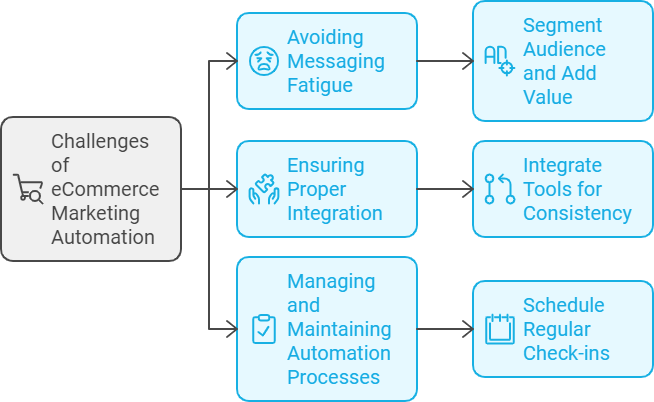
To harness the power of ecommerce marketing automation, it’s essential to implement best practices while being mindful of potential challenges.
Here’s a streamlined guide to help you get the most out of automation for your online business.
Best Practices for Success
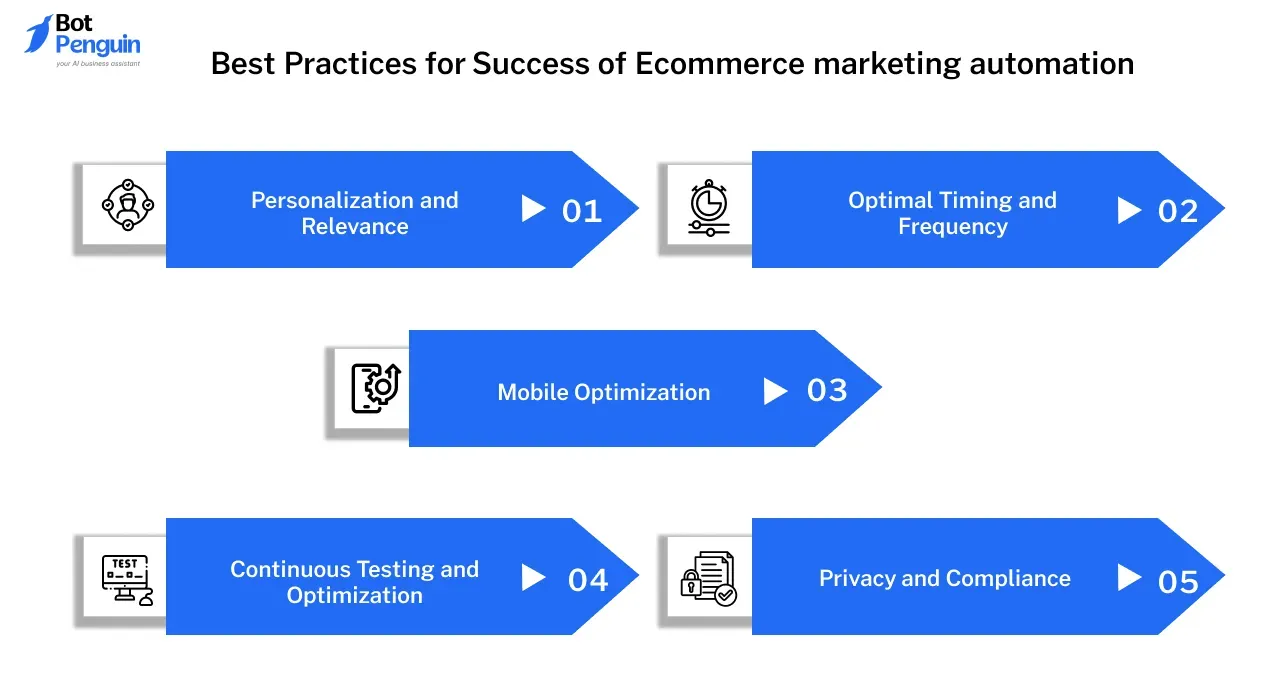
The best practices for the success of Ecommerce marketing automation are the following:
- Personalization and Relevance: Tailor automated messages, product recommendations, and offers to align with individual customer preferences.
This approach not only increases engagement but also drives conversions by creating a more meaningful customer experience.
- Optimal Timing and Frequency: Scheduling campaigns at the right moments and frequency is critical. Use data insights to determine the best times to send emails, push notifications, or chatbot messages to maintain customer interest without overwhelming them.
- Mobile Optimization: With mobile shopping on the rise, ensure all automated content—emails, landing pages, and chatbot interfaces—is optimized for mobile.
A seamless, mobile-friendly experience enhances user satisfaction and boosts engagement.
- Continuous Testing and Optimization: Use A/B testing to refine strategies. Experiment with different subject lines, CTAs, and content formats to identify the most effective tactics and improve marketing automation for ecommerce results.
- Privacy and Compliance: Adhere to data privacy regulations like GDPR or CCPA. Gaining customer consent and securely handling data builds trust and safeguards your brand’s reputation.
Overcoming Common Challenges
The challenges of Ecommerce marketing automation are the following:
- Data Privacy Concerns: Addressing privacy concerns is critical. Implement encryption, secure customer data, and conduct regular audits to reassure customers about the safety of their personal information.
- Technical and Integration Hurdles: Integrating automation tools with existing systems can be challenging. Collaborate with your IT team or vendor to troubleshoot technical issues, ensuring a smooth, efficient automation workflow.
- Measuring ROI and Effectiveness: Proving the value of ecommerce marketing automation initiatives can be complex. Set clear KPIs, track metrics, and leverage analytics tools to gauge the impact, making data-driven decisions to optimize campaigns.
Suggested Reading:
E-commerce Marketing Metrics that Matter
The Future of Ecommerce Marketing Automation
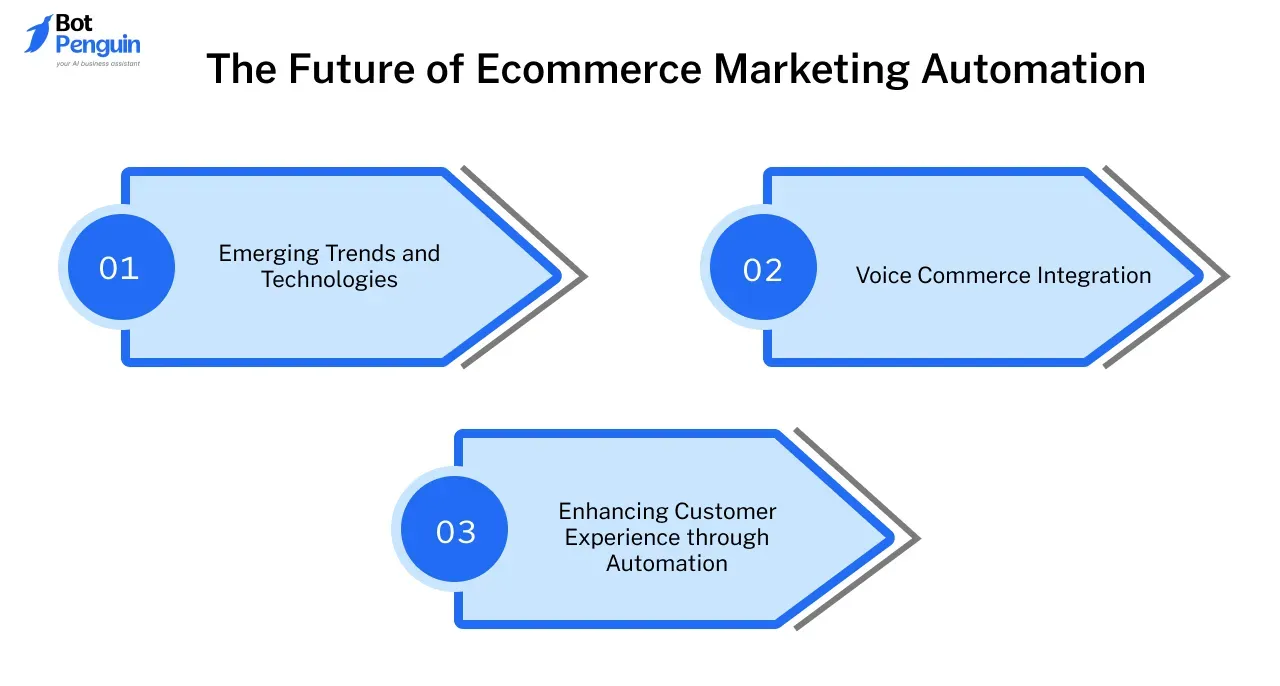
Ecommerce marketing automation is set to transform even further with advancing technology, providing businesses with new tools to stay competitive.
Emerging Trends and Technologies
AI and Machine Learning are driving automation forward, allowing for highly personalized product recommendations, predictive analytics, and seamless customer interactions.
These technologies improve user engagement and streamline marketing efforts.
Voice Commerce Integration
With voice-enabled devices gaining popularity, voice commerce is becoming an essential part of ecommerce automation.
By integrating voice shopping and search, businesses cater to the demand for hands-free, convenient shopping experiences.
Enhancing Customer Experience through Automation
Automation is key to enhancing customer experience. From responsive ecommerce chatbots to automated order notifications, businesses are using automation to deliver timely, relevant, and personalized experiences, making shopping more seamless and satisfying for customers.
Conclusion
Ecommerce marketing automation is more than just a trend; it’s an essential strategy for online businesses aiming to thrive in an increasingly competitive landscape.
By automating repetitive tasks, personalizing customer interactions, and optimizing campaigns, businesses can create a seamless, efficient, and highly engaging customer experience.
From automated emails and SMS reminders to social media scheduling and ecommerce chatbots, these tools allow brands to meet customers wherever they are with meaningful, timely interactions.
The future of ecommerce marketing automation is bright, with innovations like AI and voice commerce leading the charge toward even more intuitive, data-driven approaches.
To truly leverage the power of automation in your ecommerce journey, you need a reliable partner who understands your needs.
BotPenguin offers an affordable, feature-rich solution with over 80 integrations, helping you harness the full potential of ecommerce automation and build stronger customer relationships. Let BotPenguin elevate your ecommerce experience to new heights.
Frequently Asked Questions (FAQs)
What Are the Different Types of Ecommerce Marketing Automation?
Ecommerce marketing automation covers a range of strategies, including email marketing automation, customer segmentation, cart abandonment recovery, personalized product recommendations, and social media advertising.
Each type plays a vital role in streamlining and optimizing various areas of the ecommerce marketing process, making it easier to engage customers and drive conversions.
How Does Email Marketing Automation Benefit Ecommerce Businesses?
Email marketing automation is a powerful tool within ecommerce marketing automation, enabling personalized messaging, cart recovery emails, and targeted promotions.
This approach enhances customer engagement, streamlines campaigns, and delivers relevant content to the right audience, ultimately boosting conversions.
What Role Does Segmentation Play in Ecommerce Marketing Automation?
Segmentation in ecommerce marketing automation allows businesses to categorize customers based on behavior, preferences, and purchase history.
By tailoring communications to specific segments, businesses improve the relevance of their messages, leading to higher engagement and better marketing results.
How Does Ecommerce Marketing Automation Reduce Cart Abandonment?
Ecommerce marketing automation effectively combats cart abandonment by using personalized retargeting, timely reminders, and incentives to guide customers back to complete their purchases. This strategy significantly reduces abandonment rates and increases conversion rates.
What are the Benefits of Using Personalized Recommendations in Ecommerce Marketing Automation?
Through ecommerce marketing automation, businesses can offer personalized product recommendations based on customer data.
This approach enhances the shopping experience, increases cross-selling and upselling opportunities, and leads to higher customer satisfaction and conversions.
How can Social Media Advertising Be Integrated into Ecommerce Marketing Automation?
Social media advertising can be seamlessly integrated into ecommerce marketing automation through advanced targeting, dynamic ads, and personalized content.
By reaching customers on their preferred platforms, businesses can engage more effectively and drive traffic back to their ecommerce sites for increased sales.



